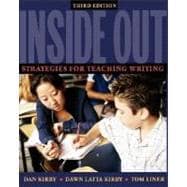
| Preface | ix | ||||
| 1. Thoughts on Becoming an Effective Teacher of writing | 1 | (13) | |||
| 2. Notes on Writing Processes | |||||
|
14 | ||||
|
1 | (1) | |||
|
1 | (19) | |||
|
20 | (4) | |||
| 3. The Classroom Environment | 24 | (18) | |||
|
24 | (2) | |||
|
26 | (1) | |||
|
26 | (1) | |||
|
27 | (3) | |||
|
30 | (4) | |||
|
34 | ||||
|
3 | (35) | |||
|
38 | (3) | |||
|
41 | (1) | |||
|
41 | (1) | |||
| 4. Getting It Down | 42 | (19) | |||
|
42 | (4) | |||
|
46 | (2) | |||
|
48 | (9) | |||
|
57 | (1) | |||
|
57 | (4) | |||
| 5. The "J" | 61 | (15) | |||
|
62 | (1) | |||
|
63 | (1) | |||
|
64 | (6) | |||
|
70 | (1) | |||
|
71 | (1) | |||
|
72 | (1) | |||
|
73 | (3) | |||
| 6. Different Voices, Different Speakers | 76 | (16) | |||
|
78 | (1) | |||
|
79 | (1) | |||
|
80 | (3) | |||
|
83 | (2) | |||
|
85 | (1) | |||
|
85 | (1) | |||
|
86 | (1) | |||
|
87 | (1) | |||
|
87 | (1) | |||
|
88 | (1) | |||
|
89 | (1) | |||
|
89 | (3) | |||
| 7. Growing Toward a Sense of Audience | 92 | (10) | |||
|
95 | (1) | |||
|
96 | (1) | |||
|
97 | (1) | |||
|
98 | (1) | |||
|
98 | (1) | |||
|
99 | (1) | |||
|
100 | (1) | |||
|
100 | (2) | |||
| 8. Responding to Student Writing | 102 | (12) | |||
|
103 | (1) | |||
|
104 | (2) | |||
|
106 | (2) | |||
|
108 | (1) | |||
|
109 | (3) | |||
|
112 | (2) | |||
| 9. What Is Good Writing? | 114 | (17) | |||
|
118 | (5) | |||
|
123 | (6) | |||
|
129 | (2) | |||
| 10. Revision: The Student as Editor | 131 | (17) | |||
|
132 | (11) | |||
|
143 | (1) | |||
|
144 | (1) | |||
|
145 | (1) | |||
|
146 | (2) | |||
| 11. Writing Poetry | 148 | (25) | |||
|
150 | (15) | |||
|
165 | (5) | |||
|
170 | (3) | |||
| 12. Writing About Literature | 173 | (20) | |||
|
174 | (1) | |||
|
175 | (1) | |||
|
176 | (2) | |||
|
178 | (5) | |||
|
183 | (6) | |||
|
189 | (1) | |||
|
190 | (1) | |||
|
191 | (2) | |||
| 13. Crafting Essays | 193 | (22) | |||
|
195 | (1) | |||
|
196 | (1) | |||
|
196 | (1) | |||
|
197 | (18) | |||
| 14. Grading and Evaluating | 215 | (26) | |||
|
216 | (2) | |||
|
218 | (1) | |||
|
219 | (1) | |||
|
220 | (1) | |||
|
220 | (2) | |||
|
222 | (1) | |||
|
223 | (4) | |||
|
227 | (4) | |||
|
231 | (3) | |||
|
234 | (3) | |||
|
237 | (2) | |||
|
239 | (2) | |||
| 15. Publishing Student Writing With and Without Computers | 241 | (15) | |||
|
241 | ||||
|
24 | (229) | |||
|
253 | (3) | |||
| 16. Resources | 256 | ||||
|
|||||
|
256 | (2) | |||
|
258 | (1) | |||
|
259 | (1) | |||
|
260 | (2) | |||
|
262 | (1) | |||
|
263 | (1) | |||
|
264 | (1) | |||
|
265 | (1) | |||
|
266 | (1) | |||
|
267 | (2) | |||
|
269 | (3) | |||
|
272 |
The New copy of this book will include any supplemental materials advertised. Please check the title of the book to determine if it should include any access cards, study guides, lab manuals, CDs, etc.
The Used, Rental and eBook copies of this book are not guaranteed to include any supplemental materials. Typically, only the book itself is included. This is true even if the title states it includes any access cards, study guides, lab manuals, CDs, etc.